选修8 unit3 Inventors and inventions difficult sentences and language points 课件(共43张PPT)
文档属性
| 名称 | 选修8 unit3 Inventors and inventions difficult sentences and language points 课件(共43张PPT) |
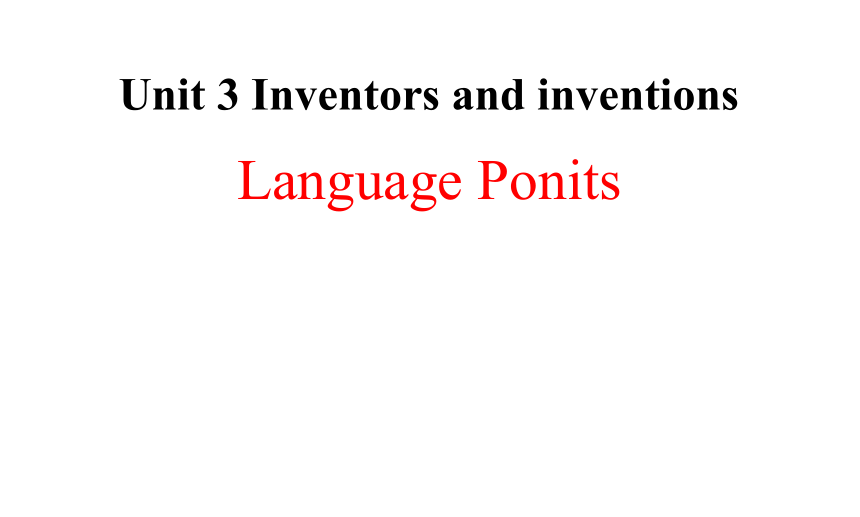
|
|
| 格式 | zip | ||
| 文件大小 | 4.3MB | ||
| 资源类型 | 教案 | ||
| 版本资源 | 人教版(新课程标准) | ||
| 科目 | 英语 | ||
| 更新时间 | 2020-04-27 00:00:00 | ||
图片预览


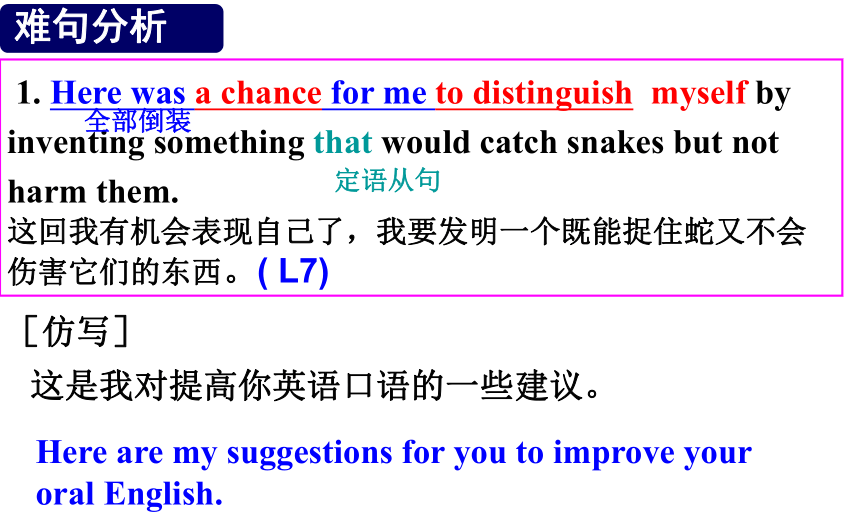
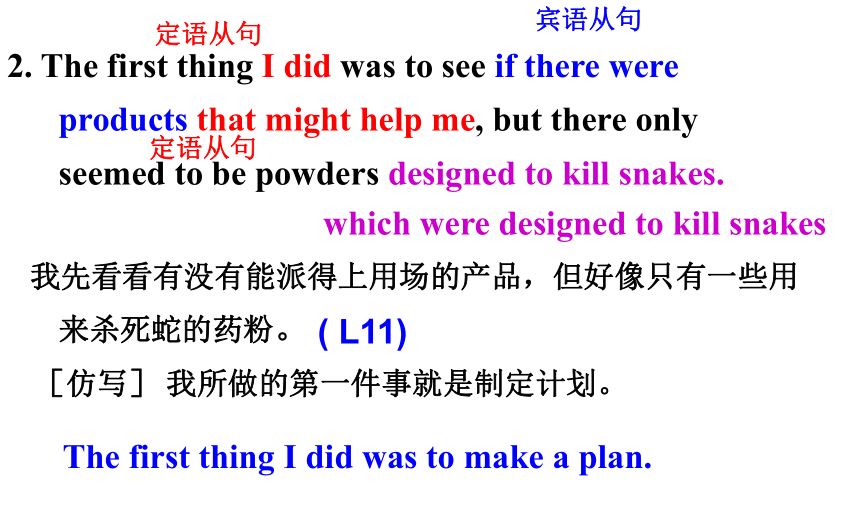

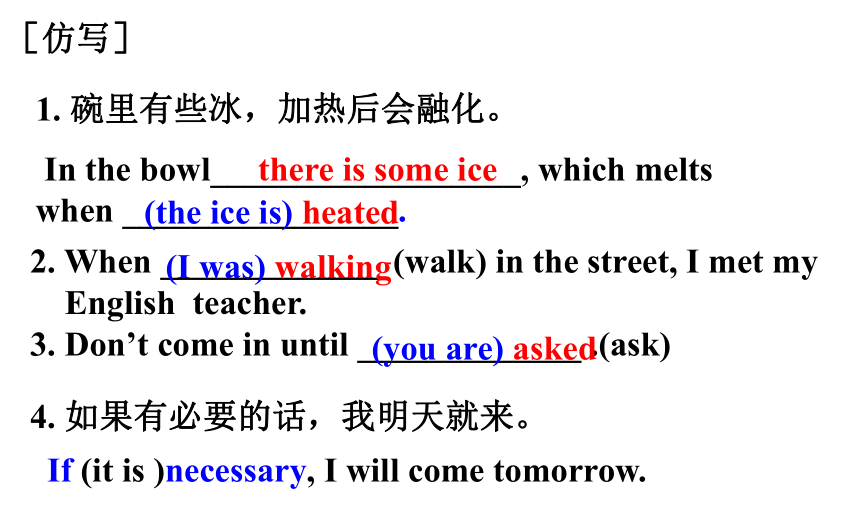
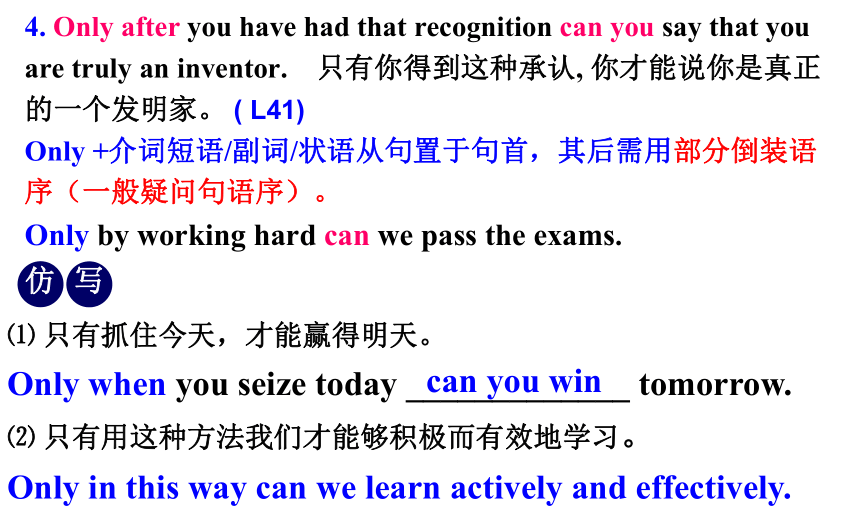
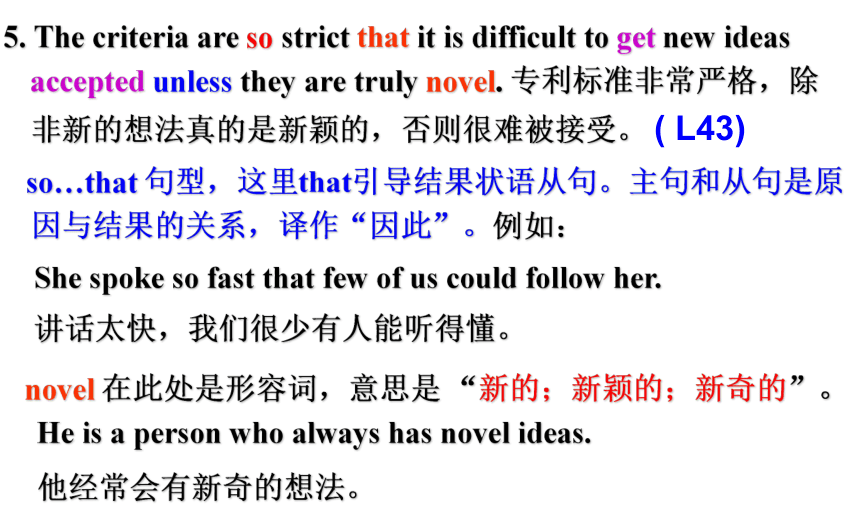
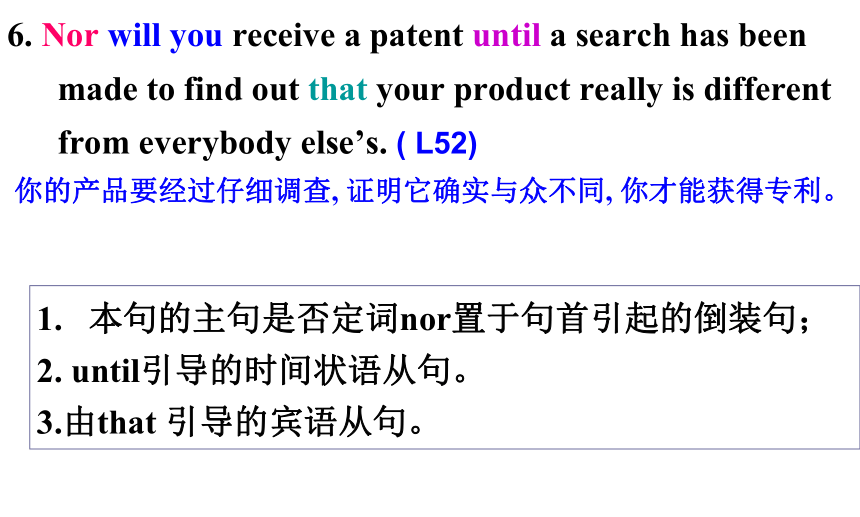
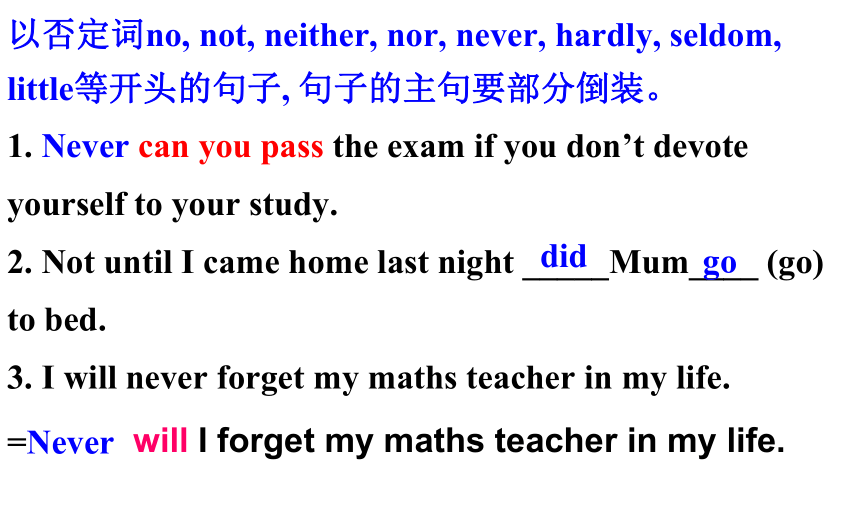
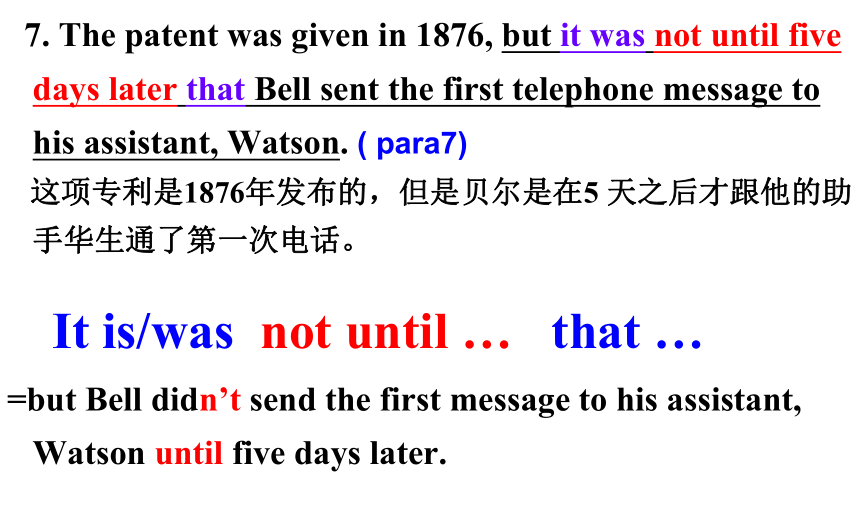

文档简介
(共47张PPT)
Unit 3 Inventors and inventions
Language Ponits
学习目标:
1. understand the difficult phrases and sentences
2. Learn about the usage of words, phrases
and some important patterns
3. learn to make use of them in the passage
and writing.
1. Here was a chance for me to distinguish myself by inventing something that would catch snakes but not harm them.
这回我有机会表现自己了,我要发明一个既能捉住蛇又不会伤害它们的东西。( L7)
这是我对提高你英语口语的一些建议。
Here are my suggestions for you to improve your oral English.
[仿写]
全部倒装
定语从句
2. The first thing I did was to see if there were products that might help me, but there only seemed to be powders designed to kill snakes.
我先看看有没有能派得上用场的产品,但好像只有一些用来杀死蛇的药粉。
[仿写] 我所做的第一件事就是制定计划。
The first thing I did was to make a plan.
定语从句
宾语从句
定语从句
which were designed to kill snakes
( L11)
3. Between the outside and inside walls of the bowl there is some jelly, which freezes hard when cooled.
在碗的内壁和外壁之间有些胶状物,冷却后会冻结。( L18)
1. 本句主干为There be 句型。
2. which引导的定语从句修饰先行词jelly
3.这个定语从句中还含着一个状语when cooled:连词+ 过去分词, 相当于when引导的状语从句:
when the jelly is cooled.
1. 碗里有些冰,加热后会融化。
In the bowl__________________, which melts when ________________.
[仿写]
2. When _____________ (walk) in the street, I met my
English teacher.
3. Don’t come in until _____________ .(ask)
4. 如果有必要的话,我明天就来。
If (it is )necessary, I will come tomorrow.
there is some ice
(the ice is) heated
(I was) walking
(you are) asked
4. Only after you have had that recognition can you say that you are truly an inventor. 只有你得到这种承认, 你才能说你是真正的一个发明家。 ( L41)
Only +介词短语/副词/状语从句置于句首,其后需用部分倒装语序(一般疑问句语序)。
Only by working hard can we pass the exams.
⑴ 只有抓住今天,才能赢得明天。
Only when you seize today _____________ tomorrow.
⑵ 只有用这种方法我们才能够积极而有效地学习。
Only in this way can we learn actively and effectively.
can you win
5. The criteria are so strict that it is difficult to get new ideas accepted unless they are truly novel. 专利标准非常严格,除非新的想法真的是新颖的,否则很难被接受。 ( L43)
so…that 句型,这里that引导结果状语从句。主句和从句是原因与结果的关系,译作“因此”。例如:
She spoke so fast that few of us could follow her.
讲话太快,我们很少有人能听得懂。
novel 在此处是形容词,意思是 “新的;新颖的;新奇的”。
He is a person who always has novel ideas.
他经常会有新奇的想法。
6. Nor will you receive a patent until a search has been made to find out that your product really is different from everybody else’s. ( L52)
你的产品要经过仔细调查, 证明它确实与众不同, 你才能获得专利。
本句的主句是否定词nor置于句首引起的倒装句;
2. until引导的时间状语从句。
3.由that 引导的宾语从句。
以否定词no, not, neither, nor, never, hardly, seldom, little等开头的句子, 句子的主句要部分倒装。
1. Never can you pass the exam if you don’t devote yourself to your study.
2. Not until I came home last night _____Mum____ (go) to bed.
3. I will never forget my maths teacher in my life.
=Never
did
go
will I forget my maths teacher in my life.
7. The patent was given in 1876, but it was not until five days later that Bell sent the first telephone message to his assistant, Watson. ( para7)
这项专利是1876年发布的,但是贝尔是在5 天之后才跟他的助手华生通了第一次电话。
=but Bell didn’t send the first message to his assistant, Watson until five days later.
It is/was not until … that …
It is/was not until… that …. 这是强调
not until 引导的时间状语从句句型。
He didn’t go to bed until he finished his homework.
=It was not until he finished his homework that he went to bed
The problem has not really arisen until now.
=It is not until now that the problem has really arisen.
Language Ponits
1. Do you know the stages every inventor must go through before they can have their invention approved?
go through
1) (法律、合同等正式)通过、接受、达成
The plan did not go through.
2) to experience or suffer sth. 经历、遭受(不愉快的事)
Most families went through a lot in the war.
3) 仔细察看、审查;详细研究,仔细琢磨
I can’t go through the letters in an hour.
Let’s go through the arguments again.
Mother went through the drawer for her glasses.
4) to use up or finish sth. completely用完、耗尽
The little boy went through two whole loaves of bread.
5) go through with sth. 完成艰难(或令人不愉快)的事
She decided not to go through with the operation.
对比: get through
1)We got through a lot of money while we were in New York.
用完、耗尽
2) Let’s start ---- there is a lot to get through.
(设法)处理,完成
3) Do you think he will get through his driving test?
顺利通过(考试等)
4) She tried to ring his boyfriend but she couldn’t get through
(用电话)接通.
2. When I called up my mother in the countryside on the telephone, she was very upset.
1) I’ll call you up tonight.
2) I was called up three months after the war broke out.
3) The old photo calls up memories of my childhood.
call sb. back 回电话,再打电话;
call sth. off 取消,罢工; call for sb. (去)接;
call for sth.需要, (公开)要求
call on sb.拜访(人) call at sp. 拜访(某地)
call sb. in 找来,叫来(服务); call sth. in 下令收回;要求退回
打电话
应征入伍
使……回忆起
My friend called me 1______ and told me that last year his boss fired some workers, but last month he called 2_____ some of the laid-off workers. The job calls 3_____ skills, so the boss decided to call 4____ a specialist to the factory and give the workers lessons. But the plan had to call 5______ because of the bad weather.
【 灵活运用】用up, off, back, for, in, on, at填空。
up
back
for
in
off
---Can I do the job?
---I’m afraid not, because it ___ skill and patience.
calls on B. calls out
C. calls up D. calls for
call at
drop in at
pay a visit to
visit
拜访某地
+sp.
1) This is the work that _______________ patience.
2) The smell of the sea ________________memories of her childhood.
3) When the war broke out, they_______________ at once and went to the front.
4) Human Rights groups are calling ______the release of political prisoners.
5) I’ll ___________ him tomorrow; do you want to visit him with me?
6) Cars with serious faults have been called _____ by the manufactures.
calls for
calls up
were called up
for
call on
in
3. Snakes come near the house now and then, and they seem to have made their home here, not far from the walnut tree.
now and then 含义:______________;
相近含义的表达有:_________________________________________________
偶尔;有时
from time to time; at times; occasionally
拓展:
from now on 从现在开始;今后
from then on 从那时起
just now 刚才/刚, 一会儿前
since then 从那时起;从那以后
by now / up to now / till now / so far 到现在为止
我偶尔看见他,但不常见。
I see him (every) now and then, but not often.
4. distinguish 辨别, 区别
I can’t distinguish the twins, for they are so alike.
Can you distinguish between those two objects?
你能区分那两个物体吗?
Children should be taught to distinguish right from wrong. 应当教育孩子分辨好坏。
distinguish…from = distinguish between … and …
把…...与…...加以分开
tell the difference between … and …= tell …from… 把......与......区分开
distinguish oneself 显扬自己,使自己扬名
The man distinguished himself by his wisdom.
这个人因智慧而扬名。
Here was a chance for me to distinguish myself by inventing something.
这回我有机会通过发明某种东西来表现一下自己了。
distinguish vi. & vt. 显示…的差别; 使…有所不同; 辨别
distinguished adj. 卓越的; 杰出的; 著名的; 显得重要 的;
高贵的; 有尊严的
distinction n. 差别; 区别; 对比; 优秀;
杰出; 卓越; 区分; 分清; 辨别
distinguish oneself 显扬自己; 使自己扬名
distinguish (between) A and B
distinguish A from B
1).distinguish
2).distinguish right from wrong /
distinguish between right and wrong
5. I set about researching the habits of snakes so I could trap them in the easiest way to trap them. (Page 20)
Bell never set out to invent the telephone and what he was trying to design was multiple telegraph. (Page 25)
1) set about doing sth =__________________着手; 开始
2) He __________________________ (solve) the problem as soon as he arrived there.
= He ________________________ (solve) the problem as soon as he arrived there.
3) set out 另一意思为“动身”, “出发”, 后面常跟介词for。set out for = set off for = leave for
They have set out (= set off) for Shanghai.
set out to do sth.
set about solving
set out to solve
set out to do sth. 开始做某事
set about doing 着手;开始
set down 记下, 写下;制定,规定(规则、原则等)
set off 启程;出发;点燃;使爆炸;发射
set up 设立,建起,设置;创办,开办
set sth. aside 把…放到一旁(或搁到一边);省出,留出(钱或
时间); 暂时不考虑
【 归纳总结】
1) The day when they _______________ was cold and windy and looked as if it would rain.
2) She ______________ all her working experience in her resume.
3) The government has _______________ a committee to look into the affair.
4) Li Ming agreed to move and ___________________ packing all his goods.
5) She tries to _________________ some money every month for her retirement.
6) A gang of boys were _________________ fireworks in the street.
set off/out
set down
set up
set about
set aside
setting off
6. They abruptly disappeared into a convenient hole in the wall.
突然一下子就消失在附近的墙洞里了。
abruptly adv.突然地,唐突地 abrupt adj.突然的;意外的
Ex. 这路有很多急转弯。
The road is full of ________________.
abrupt turns
It is convenient to/for sb 对某人来说很方便
It is convenient for sb to do sth 对某人来说做某事是
方便的
for convenience 为方便起见
at one’s convenience 在某人方便的时候
convenient adj. 方便的;便利的;附近的
convenience [u] 方便,便利 [c] 方便的事
警示: convenient 不能以人作主语。
This dishwasher is very convenient to me.
你方便明天开始工作吗?
Will it be convenient for you to start work
tomorrow?
有一个超级市场在附近是很方便的.
It’s convenient to have a supermarket
nearby.
1).convenient
2).Will it be convenient for you
3).at
4).whenever it is convenient for/to you
5).convenient; convenience
1) Will 3 o’clock be _____________________ for you?
2) ___________________________________ to start work tomorrow? (明天开始工作你方便吗?)
3) Please do this job ____ your convenience
4) Come and see me ______________ ____ ____ _______________ ____ _____. (无论何时你方便).
5) We must arrange a _________________ time and place for the discussion. At the same time, we had better keep our reference books nearby for _______________(方便).
While unfinished, he was ugly, but now he
was a living horror.
while unfinished,... =
7. Between the outside and inside walls of the bowl there is
some jelly, which freezes hard when cooled.
when cooled为when it is cooled的省略形式。
在when, while, once, unless, if 等连词所引导的状语从句中,
如果从句的主语与主句的主语相同, 常常可用“状语连词 +分词
短语”的结构来代替。
= You must be careful _____________ the street.
e.g. You must be careful when you cross the street.
While he was unfinished
when crossing
When ____ help, one often says “thank
you” or “ it’s kind of you”.
A. offering B. to offer
C. to be offered D. offered
D
1._________ with the size of the whole earth, the biggest ocean does not seem big at all.
2. ________ the two books , you will find the second one is better.
Compare B. to compare
C. Comparing D. compared
3. _____more time, we are sure to finish it.
A. Given B. Giving C. Be given D. If giving
D
A
C
Keys: 3).Compared 4).Comparing 5).Given
compare…with…
be compared with…
Leave the beaten track occasionally and dive into the woods. 偶尔离开平路去寻求困境。(P 25)
8.dive into 潜心研究;溜进;跳入;迅速把手伸入
⑴ He dived into the history of China.
( )
⑵ The boy dived into the river from the bridge.( )
⑶ He dived into his pockets and fished out one dollar.( )
⑷ The snake dived into its hole. ( )
【 熟读深思】
潜心研究
跳入
迅速把手伸入
钻进;跑入
8. Although he is most associated with the invention of the
telephone, he was indeed a continuing …
虽然他一直以发明电话闻名于世, 但是他的确是一个永不停息
associate vt. 联想, 把……联想在一起 [+with] They associate turkey with Thanksgiving. 他们把火鸡和感恩节联系在一起。
I didn’t want to be associated with it at all. 我根本不想与这事有牵连。
相近意思短语:be related to ; in relation to;
be linked with / to
associate n. [C] 伙伴;同事;朋友;合伙人 He is one of my associates at the store. 他是我店里的一位同事。
2) indeed adv. (加强语气) 真正地, 确实, 实在 A friend in need is a friend indeed.
10. I cannot bear the smell of burnt sausage on the barbecue.
bear vt. 过去式____________; 过去分词___________; 含义是_________________;
常用于否定句和疑问句中与can /could连用,表示承受,忍受.
1) The pain was almost more than he could bear.
4) The little girl can’t bear to be laughed at.
= The little girl can’t bear being laughed at.
6) You must bear in mind that your parents hope to depend on you to become a good doctor.
常见短语:bear / keep sb./sth. in mind;
bear/ keep in mind that 将…记在心中
bear doing
bear to do sth
bore
borne
忍受/耐;负担
D B C C C C A D C B
3) At dawn, they set ____ to get ready for the work of the
day.
A. off B. about C. out D. in
5) They ______________ the mountain at noon.
A. set off to B. set out to C. set out for D. set off in
6) Come and see me whenever ___________________.
A. you are convenient B. you will be convenient
C. it is convenient to you D. it will be convenient to you
Unit 3 Inventors and inventions
Language Ponits
学习目标:
1. understand the difficult phrases and sentences
2. Learn about the usage of words, phrases
and some important patterns
3. learn to make use of them in the passage
and writing.
1. Here was a chance for me to distinguish myself by inventing something that would catch snakes but not harm them.
这回我有机会表现自己了,我要发明一个既能捉住蛇又不会伤害它们的东西。( L7)
这是我对提高你英语口语的一些建议。
Here are my suggestions for you to improve your oral English.
[仿写]
全部倒装
定语从句
2. The first thing I did was to see if there were products that might help me, but there only seemed to be powders designed to kill snakes.
我先看看有没有能派得上用场的产品,但好像只有一些用来杀死蛇的药粉。
[仿写] 我所做的第一件事就是制定计划。
The first thing I did was to make a plan.
定语从句
宾语从句
定语从句
which were designed to kill snakes
( L11)
3. Between the outside and inside walls of the bowl there is some jelly, which freezes hard when cooled.
在碗的内壁和外壁之间有些胶状物,冷却后会冻结。( L18)
1. 本句主干为There be 句型。
2. which引导的定语从句修饰先行词jelly
3.这个定语从句中还含着一个状语when cooled:连词+ 过去分词, 相当于when引导的状语从句:
when the jelly is cooled.
1. 碗里有些冰,加热后会融化。
In the bowl__________________, which melts when ________________.
[仿写]
2. When _____________ (walk) in the street, I met my
English teacher.
3. Don’t come in until _____________ .(ask)
4. 如果有必要的话,我明天就来。
If (it is )necessary, I will come tomorrow.
there is some ice
(the ice is) heated
(I was) walking
(you are) asked
4. Only after you have had that recognition can you say that you are truly an inventor. 只有你得到这种承认, 你才能说你是真正的一个发明家。 ( L41)
Only +介词短语/副词/状语从句置于句首,其后需用部分倒装语序(一般疑问句语序)。
Only by working hard can we pass the exams.
⑴ 只有抓住今天,才能赢得明天。
Only when you seize today _____________ tomorrow.
⑵ 只有用这种方法我们才能够积极而有效地学习。
Only in this way can we learn actively and effectively.
can you win
5. The criteria are so strict that it is difficult to get new ideas accepted unless they are truly novel. 专利标准非常严格,除非新的想法真的是新颖的,否则很难被接受。 ( L43)
so…that 句型,这里that引导结果状语从句。主句和从句是原因与结果的关系,译作“因此”。例如:
She spoke so fast that few of us could follow her.
讲话太快,我们很少有人能听得懂。
novel 在此处是形容词,意思是 “新的;新颖的;新奇的”。
He is a person who always has novel ideas.
他经常会有新奇的想法。
6. Nor will you receive a patent until a search has been made to find out that your product really is different from everybody else’s. ( L52)
你的产品要经过仔细调查, 证明它确实与众不同, 你才能获得专利。
本句的主句是否定词nor置于句首引起的倒装句;
2. until引导的时间状语从句。
3.由that 引导的宾语从句。
以否定词no, not, neither, nor, never, hardly, seldom, little等开头的句子, 句子的主句要部分倒装。
1. Never can you pass the exam if you don’t devote yourself to your study.
2. Not until I came home last night _____Mum____ (go) to bed.
3. I will never forget my maths teacher in my life.
=Never
did
go
will I forget my maths teacher in my life.
7. The patent was given in 1876, but it was not until five days later that Bell sent the first telephone message to his assistant, Watson. ( para7)
这项专利是1876年发布的,但是贝尔是在5 天之后才跟他的助手华生通了第一次电话。
=but Bell didn’t send the first message to his assistant, Watson until five days later.
It is/was not until … that …
It is/was not until… that …. 这是强调
not until 引导的时间状语从句句型。
He didn’t go to bed until he finished his homework.
=It was not until he finished his homework that he went to bed
The problem has not really arisen until now.
=It is not until now that the problem has really arisen.
Language Ponits
1. Do you know the stages every inventor must go through before they can have their invention approved?
go through
1) (法律、合同等正式)通过、接受、达成
The plan did not go through.
2) to experience or suffer sth. 经历、遭受(不愉快的事)
Most families went through a lot in the war.
3) 仔细察看、审查;详细研究,仔细琢磨
I can’t go through the letters in an hour.
Let’s go through the arguments again.
Mother went through the drawer for her glasses.
4) to use up or finish sth. completely用完、耗尽
The little boy went through two whole loaves of bread.
5) go through with sth. 完成艰难(或令人不愉快)的事
She decided not to go through with the operation.
对比: get through
1)We got through a lot of money while we were in New York.
用完、耗尽
2) Let’s start ---- there is a lot to get through.
(设法)处理,完成
3) Do you think he will get through his driving test?
顺利通过(考试等)
4) She tried to ring his boyfriend but she couldn’t get through
(用电话)接通.
2. When I called up my mother in the countryside on the telephone, she was very upset.
1) I’ll call you up tonight.
2) I was called up three months after the war broke out.
3) The old photo calls up memories of my childhood.
call sb. back 回电话,再打电话;
call sth. off 取消,罢工; call for sb. (去)接;
call for sth.需要, (公开)要求
call on sb.拜访(人) call at sp. 拜访(某地)
call sb. in 找来,叫来(服务); call sth. in 下令收回;要求退回
打电话
应征入伍
使……回忆起
My friend called me 1______ and told me that last year his boss fired some workers, but last month he called 2_____ some of the laid-off workers. The job calls 3_____ skills, so the boss decided to call 4____ a specialist to the factory and give the workers lessons. But the plan had to call 5______ because of the bad weather.
【 灵活运用】用up, off, back, for, in, on, at填空。
up
back
for
in
off
---Can I do the job?
---I’m afraid not, because it ___ skill and patience.
calls on B. calls out
C. calls up D. calls for
call at
drop in at
pay a visit to
visit
拜访某地
+sp.
1) This is the work that _______________ patience.
2) The smell of the sea ________________memories of her childhood.
3) When the war broke out, they_______________ at once and went to the front.
4) Human Rights groups are calling ______the release of political prisoners.
5) I’ll ___________ him tomorrow; do you want to visit him with me?
6) Cars with serious faults have been called _____ by the manufactures.
calls for
calls up
were called up
for
call on
in
3. Snakes come near the house now and then, and they seem to have made their home here, not far from the walnut tree.
now and then 含义:______________;
相近含义的表达有:_________________________________________________
偶尔;有时
from time to time; at times; occasionally
拓展:
from now on 从现在开始;今后
from then on 从那时起
just now 刚才/刚, 一会儿前
since then 从那时起;从那以后
by now / up to now / till now / so far 到现在为止
我偶尔看见他,但不常见。
I see him (every) now and then, but not often.
4. distinguish 辨别, 区别
I can’t distinguish the twins, for they are so alike.
Can you distinguish between those two objects?
你能区分那两个物体吗?
Children should be taught to distinguish right from wrong. 应当教育孩子分辨好坏。
distinguish…from = distinguish between … and …
把…...与…...加以分开
tell the difference between … and …= tell …from… 把......与......区分开
distinguish oneself 显扬自己,使自己扬名
The man distinguished himself by his wisdom.
这个人因智慧而扬名。
Here was a chance for me to distinguish myself by inventing something.
这回我有机会通过发明某种东西来表现一下自己了。
distinguish vi. & vt. 显示…的差别; 使…有所不同; 辨别
distinguished adj. 卓越的; 杰出的; 著名的; 显得重要 的;
高贵的; 有尊严的
distinction n. 差别; 区别; 对比; 优秀;
杰出; 卓越; 区分; 分清; 辨别
distinguish oneself 显扬自己; 使自己扬名
distinguish (between) A and B
distinguish A from B
1).distinguish
2).distinguish right from wrong /
distinguish between right and wrong
5. I set about researching the habits of snakes so I could trap them in the easiest way to trap them. (Page 20)
Bell never set out to invent the telephone and what he was trying to design was multiple telegraph. (Page 25)
1) set about doing sth =__________________着手; 开始
2) He __________________________ (solve) the problem as soon as he arrived there.
= He ________________________ (solve) the problem as soon as he arrived there.
3) set out 另一意思为“动身”, “出发”, 后面常跟介词for。set out for = set off for = leave for
They have set out (= set off) for Shanghai.
set out to do sth.
set about solving
set out to solve
set out to do sth. 开始做某事
set about doing 着手;开始
set down 记下, 写下;制定,规定(规则、原则等)
set off 启程;出发;点燃;使爆炸;发射
set up 设立,建起,设置;创办,开办
set sth. aside 把…放到一旁(或搁到一边);省出,留出(钱或
时间); 暂时不考虑
【 归纳总结】
1) The day when they _______________ was cold and windy and looked as if it would rain.
2) She ______________ all her working experience in her resume.
3) The government has _______________ a committee to look into the affair.
4) Li Ming agreed to move and ___________________ packing all his goods.
5) She tries to _________________ some money every month for her retirement.
6) A gang of boys were _________________ fireworks in the street.
set off/out
set down
set up
set about
set aside
setting off
6. They abruptly disappeared into a convenient hole in the wall.
突然一下子就消失在附近的墙洞里了。
abruptly adv.突然地,唐突地 abrupt adj.突然的;意外的
Ex. 这路有很多急转弯。
The road is full of ________________.
abrupt turns
It is convenient to/for sb 对某人来说很方便
It is convenient for sb to do sth 对某人来说做某事是
方便的
for convenience 为方便起见
at one’s convenience 在某人方便的时候
convenient adj. 方便的;便利的;附近的
convenience [u] 方便,便利 [c] 方便的事
警示: convenient 不能以人作主语。
This dishwasher is very convenient to me.
你方便明天开始工作吗?
Will it be convenient for you to start work
tomorrow?
有一个超级市场在附近是很方便的.
It’s convenient to have a supermarket
nearby.
1).convenient
2).Will it be convenient for you
3).at
4).whenever it is convenient for/to you
5).convenient; convenience
1) Will 3 o’clock be _____________________ for you?
2) ___________________________________ to start work tomorrow? (明天开始工作你方便吗?)
3) Please do this job ____ your convenience
4) Come and see me ______________ ____ ____ _______________ ____ _____. (无论何时你方便).
5) We must arrange a _________________ time and place for the discussion. At the same time, we had better keep our reference books nearby for _______________(方便).
While unfinished, he was ugly, but now he
was a living horror.
while unfinished,... =
7. Between the outside and inside walls of the bowl there is
some jelly, which freezes hard when cooled.
when cooled为when it is cooled的省略形式。
在when, while, once, unless, if 等连词所引导的状语从句中,
如果从句的主语与主句的主语相同, 常常可用“状语连词 +分词
短语”的结构来代替。
= You must be careful _____________ the street.
e.g. You must be careful when you cross the street.
While he was unfinished
when crossing
When ____ help, one often says “thank
you” or “ it’s kind of you”.
A. offering B. to offer
C. to be offered D. offered
D
1._________ with the size of the whole earth, the biggest ocean does not seem big at all.
2. ________ the two books , you will find the second one is better.
Compare B. to compare
C. Comparing D. compared
3. _____more time, we are sure to finish it.
A. Given B. Giving C. Be given D. If giving
D
A
C
Keys: 3).Compared 4).Comparing 5).Given
compare…with…
be compared with…
Leave the beaten track occasionally and dive into the woods. 偶尔离开平路去寻求困境。(P 25)
8.dive into 潜心研究;溜进;跳入;迅速把手伸入
⑴ He dived into the history of China.
( )
⑵ The boy dived into the river from the bridge.( )
⑶ He dived into his pockets and fished out one dollar.( )
⑷ The snake dived into its hole. ( )
【 熟读深思】
潜心研究
跳入
迅速把手伸入
钻进;跑入
8. Although he is most associated with the invention of the
telephone, he was indeed a continuing …
虽然他一直以发明电话闻名于世, 但是他的确是一个永不停息
associate vt. 联想, 把……联想在一起 [+with] They associate turkey with Thanksgiving. 他们把火鸡和感恩节联系在一起。
I didn’t want to be associated with it at all. 我根本不想与这事有牵连。
相近意思短语:be related to ; in relation to;
be linked with / to
associate n. [C] 伙伴;同事;朋友;合伙人 He is one of my associates at the store. 他是我店里的一位同事。
2) indeed adv. (加强语气) 真正地, 确实, 实在 A friend in need is a friend indeed.
10. I cannot bear the smell of burnt sausage on the barbecue.
bear vt. 过去式____________; 过去分词___________; 含义是_________________;
常用于否定句和疑问句中与can /could连用,表示承受,忍受.
1) The pain was almost more than he could bear.
4) The little girl can’t bear to be laughed at.
= The little girl can’t bear being laughed at.
6) You must bear in mind that your parents hope to depend on you to become a good doctor.
常见短语:bear / keep sb./sth. in mind;
bear/ keep in mind that 将…记在心中
bear doing
bear to do sth
bore
borne
忍受/耐;负担
D B C C C C A D C B
3) At dawn, they set ____ to get ready for the work of the
day.
A. off B. about C. out D. in
5) They ______________ the mountain at noon.
A. set off to B. set out to C. set out for D. set off in
6) Come and see me whenever ___________________.
A. you are convenient B. you will be convenient
C. it is convenient to you D. it will be convenient to you
